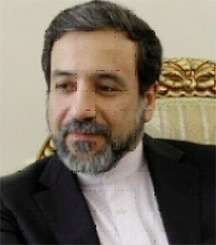LAUSANNE, Switzerland (Reuters) – Iran and major powers were struggling yesterday to reach a preliminary nuclear accord as “gloom” set in, with both sides sticking to their positions a day before a self-imposed deadline.

For days Iran, the United States, Britain, France, Germany, Russia and China have been trying to break an impasse in negotiations aimed at ensuring that Tehran cannot develop a nuclear bomb, in exchange for an easing of United Nations sanctions that are crippling its economy.
But officials at the talks in the Swiss city of Lausanne said attempts to reach a framework accord, intended as a prelude to a comprehensive agreement by the end of June, could yet fall apart, and that they were at any rate likely to run until the deadline of midnight (2200 GMT) on Tuesday or beyond.
“There still remain some difficult issues,” US Secretary of State John Kerry told CNN. “We are working into the night and obviously into tomorrow … Everyone knows the meaning of tomorrow.”
Kerry’s spokeswoman Marie Harf said there was a 50/50 chance the parties would succeed in getting a deal today.
Senior Iranian negotiator Abbas Araqchi said various proposals were being discussed. “Still, we cannot say we are close to resolving the remaining issues,” he told reporters. “We hope to reach a conclusion tonight or tomorrow, but it is not guaranteed and we have a difficult way to go.”
A Western diplomat said three major sticking points remained, and it was unclear whether they could be resolved.
They related to the duration of any limits on Iranian uranium enrichment and research and development activities after an initial 10 years; the lifting of UN sanctions; and their restoration if Iran breached the agreement.
Tehran, which denies trying to develop a nuclear weapons capability, is demanding a swift end to sanctions in exchange for limits on its atomic activities.
Highlighting the general mood, a diplomat quoted by the Chinese news agency Xinhua said the atmosphere among negotiators had turned yesterday from optimism to “gloom”.
In addition to Kerry, Iranian Foreign Minister Mohammad Javad Zarif, British Foreign Secretary Philip Hammond, French Foreign Minister Laurent Fabius, Germany’s Frank-Walter Steinmeier, China’s Wang Yi and Russia’s Sergei Lavrov gathered at the 19th-century hotel overlooking Lake Geneva.
After the first meeting since November of all the ministers, Lavrov returned to Moscow for an engagement, though officials said he would return if there was something to announce.
Israeli Prime Minister Benjamin Netanyahu, who has campaigned against a deal, said in Jerusalem that the agreement being put together sent the message that “Iran stands to gain by its aggression”.
Western officials said the two sides had previously been closing in on a preliminary deal that could be summarised in a 2-3 page document.
A further sticking point concerns Iran’s demand to continue with research into newer generations of advanced centrifuges. These can purify uranium faster and in greater quantities than those it currently operates, for use in nuclear power plants or – if very highly enriched – in weapons.
Even if a framework deal is reached by the deadline, officials say it could still fall apart when the two sides attempt to agree all the technical details for a comprehensive accord by the end of June.
There were several examples of progress and setbacks. Western officials said Iran had suggested it could keep fewer than 6,000 centrifuges in operation, down from an offer of nearly 10,000, and ship most of its enriched uranium to Russia.
But Iranian negotiator Abbas Araqchi said dispatching uranium stockpiles abroad “was not on Iran’s agenda”.
Still, negotiators said stockpiles were not a dealbreaker. Harf said there were other viable options besides shipping the stockpiles abroad. Other officials said one option was dilution.